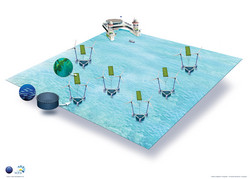Offshore platforms for sustainable development of ocean resources
The aim of the EU-backed TROPOS (Modular multi-use deep water offshore platform harnessing and servicing Mediterranean, subtropical and tropical marine and maritime resources) project was to develop a floating 'Multi-use platform' (MUP) capable of operating in deep water where fixed structures are not feasible. The platform comprises a central unit with different modules for aquaculture, maritime transport, renewable energy and leisure. These modules will allow access to the ocean's resources and ensure they are used in a sustainable way. TROPOS and its sister projects H2OCEAN and MERMAID were part of the 'Ocean of tomorrow' cross-thematic initiative whose objective was to develop new ideas for sustainable development of the marine environment. TROPOS developed MUPs capable of sharing sites, infrastructures and reduced costs while minimising negative environmental impacts. Project partners identified MUP locations that had marine renewable energy sources and were suitable for aquaculture, leisure and maritime transport support services. The consortium also developed innovative designs for platforms that enable them to be spaced close together. Appropriate locations were identified for the different concepts with the help of a specifically designed support tool. A Green & Blue scenario was located north of Crete, integrating wind energy exploitation and fish and algae aquaculture. The Leisure Island scenario was sited off the coast of Gran Canaria and combines leisure facilities with the use of solar energy. The Sustainable Service Hub was located on the Dogger Bank in the North Sea and focuses on transport and energy-related needs. In addition, two future scenarios were also developed. The first was a Green & Blue scenario in Taiwan, which integrates aquaculture ocean thermal energy conversion for energy supply. The second was the Offshore Container Terminal in Panama, which is intended to serve as a central energy and transport hub. The design of the three official scenarios was specified in great detail. All scenarios were assessed by considering their particular logistic requirements, economic viability, and environmental and socioeconomic impacts, and refined according to the results wherever necessary and feasible. MUPs developed by the TROPOS consortium promise an exciting, innovative and environment-friendly solution for harnessing solar and offshore renewable energy and other resources from the marine environment.
Keywords
Offshore platforms, ocean, marine, renewable energy, deep water, maritime, multi-use platform



